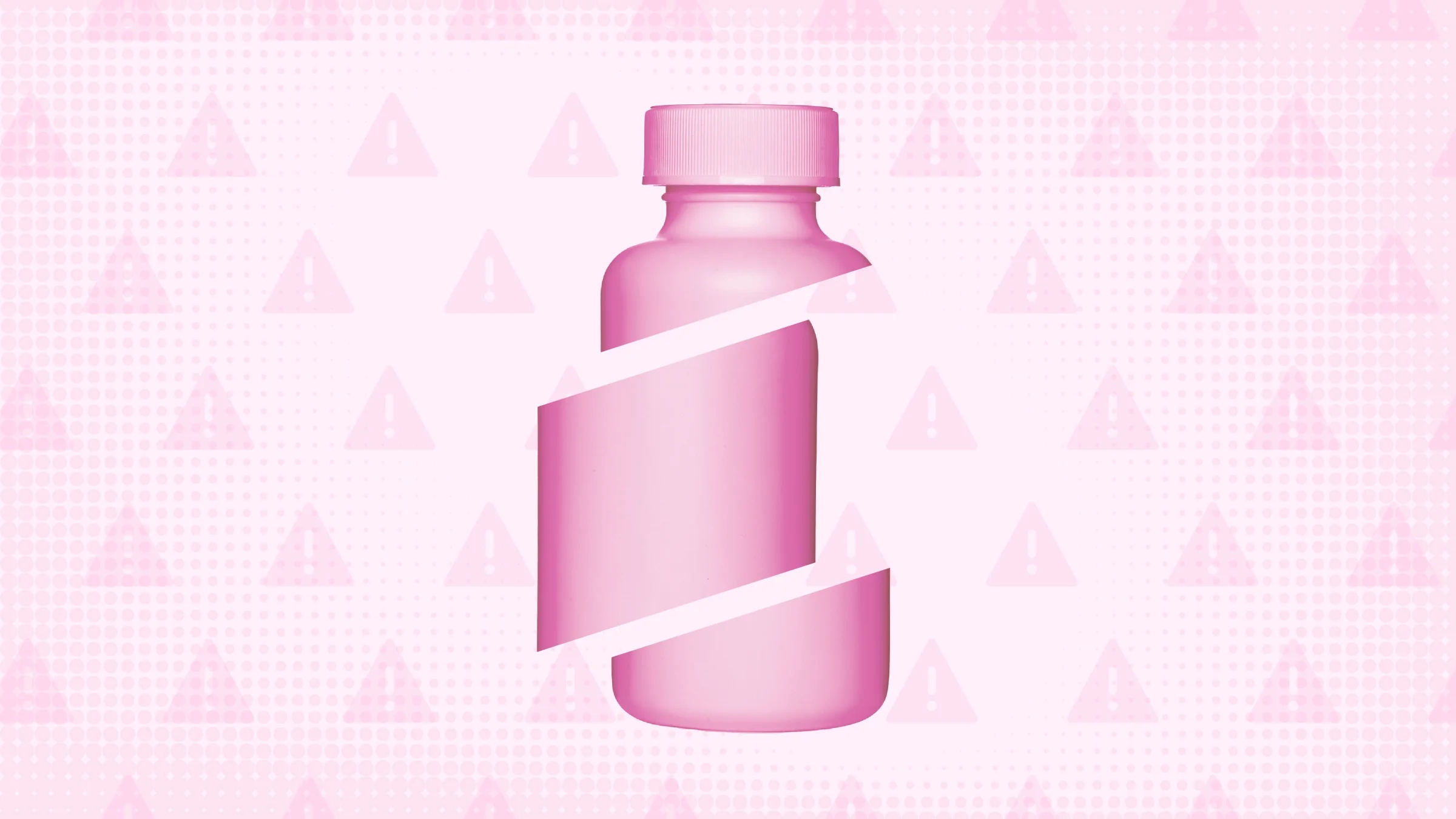Key takeaways:
Nexletol (bempedoic acid) is a statin alternative for high cholesterol. Common Nexletol side effects include upper respiratory infections, muscle spasms, and stomach pain.
Anemia, high uric acid levels, and increased liver enzymes can also occur while taking Nexletol. These side effects are typically mild and rarely cause noticeable effects.
In rare cases, Nexletol can cause tendon injury, especially if you’re also taking statins or other medications with this side effect.
Save on related medications
If you’re living with high cholesterol and can’t take statins, your prescriber might suggest a different option — Nexletol (bempedoic acid). Nexletol helps lower “bad” cholesterol, also called LDL, by stopping the liver from making too much of it. Lowering your LDL can help protect your heart and lower the risk of heart attacks or strokes.
Nexletol is often prescribed for those who can’t take statins because of side effects. Sometimes, it’s also added to statins for extra cholesterol-lowering power. But like any medicine, Nexletol has side effects of its own.
In this article, we’ll go over common and rare Nexletol side effects and what to do if they happen. Whether you’re just starting Nexletol or have been taking it for a while, this guide is here to help.
Nexletol side effects at a glance
Nexletol can cause a range of side effects. Sometimes, these side effects go away on their own, while others may require you to stop taking Nexletol.
Below is a list of common and rare Nexletol side effects. This isn’t a complete list of all possible side effects. So if you experience any concerning side effects, reach out to your healthcare team, even if they’re not listed here.
Common Nexletol side effects include:
Upper respiratory tract infections
Muscle spasms
Increased uric acid levels
Back pain
Increased liver enzymes
Stomach pain



Rare, but more serious Nexletol side effects include:
Anemia (low red blood cell count)
Gallstones
Gout
Kidney problems
Tendon injuries
Let’s take a closer look at seven Nexletol side effects and what to do if they occur.
1. Upper respiratory tract infections
Nexletol may increase your risk of upper respiratory tract infections. These include the common cold, sinus infections, and the flu. It’s less common, but Nexletol may also increase your risk of developing bronchitis, a more serious lung infection.
Upper respiratory infections usually get better on their own with time. Make sure you stay hydrated and get plenty of rest to help your body heal. If needed, you can take over-the-counter (OTC) cough and cold medications to help manage your symptoms.
Seek medical care if your symptoms don’t improve after a week or if you develop a fever that lasts for more than 3 days. These may be signs of a more serious infection that requires additional treatment.
Statin alternatives: Learn more about 7 other medication options to help you lower your cholesterol levels.
Nexletol vs. statins: Read about how these two cholesterol treatments compare.
Tips for success: Making a few changes to your diet can help you meet your cholesterol goals. Find out which foods have the most impact.
2. Muscle spasms and pain
Muscle spasms and pain are a possible Nexletol side effect. Muscle spasms often affect the legs (typically referred to as a charley horse). But they can also affect any muscle in the body, such as in your back or arms. You may feel sore or achy as a result.
Overall, Nexletol is less likely to cause muscle pain than statins. But taking Nexletol along with a statin may raise the risk of this side effect.
Although muscle spasms are usually harmless, they can be bothersome. Gentle stretching, light exercise, or applying warm compresses may help relieve discomfort. Staying hydrated and incorporating foods rich in electrolytes, such as avocados and bananas, can also help.
If muscle spasms become an issue for you while taking Nexletol, let your prescriber know. They may recommend an additional medication to help manage them. Or they may want you to try a different cholesterol medication altogether.
3. Increased uric acid levels
Uric acid is a waste product that your kidneys help remove from the body. Nexletol prevents the kidneys from removing uric acid, which can lead to high uric acid levels in your bloodstream. This typically happens within the first 4 weeks of Nexletol treatment, and may continue throughout treatment.
A high uric acid level isn't always an issue. But it can lead to gout, kidney stones, or urinary tract infections for some people. Be sure to let your prescriber know if you develop any of the following symptoms while taking Nexletol:
Swollen, warm, or painful joints
Pain when peeing
Peeing or feeling the urge to pee more often
Lower back or groin pain
Your prescriber can check your uric acid levels and prescribe a medication such as allopurinol (Zyloprim) if you need to lower them. In severe cases, you may need to stop taking Nexletol.
4. Stomach pain
Nexletol can cause stomach pain or discomfort. The intensity of stomach pain varies from person to person, but it usually goes away on its own.
If stomach pain occurs around the time you take Nexletol, try taking it with food. You can also help manage stomach pain by staying hydrated, eating smaller meals, and avoiding spicy or greasy foods.
Let your prescriber know if stomach pain worsens or becomes bothersome. But if stomach pain is severe or you have other symptoms, such as vomiting, seek medical care.
Good to know: Right-sided stomach pain, or stomach pain that happens after eating fatty foods can be a sign of gallstones, a rare Nexletol side effect. Let your healthcare team know if you’re experiencing this type of stomach pain, as you may need further treatment.
5. Anemia
Anemia is another possible Nexletol side effect. It happens when the body doesn’t have enough red blood cells to carry oxygen to your body. If anemia is mild, you may not have any symptoms at all. But in more severe cases, you may feel tired, dizzy, or short of breath.
Nexletol-induced anemia is usually mild. But let your prescriber know if you experience any signs or symptoms of anemia. They can check your blood cell levels to see if anemia is an issue and take steps to manage it.
6. Increased liver enzymes
Nexletol can raise liver enzyme levels, especially within the first 4 weeks of use. In most cases, increased liver enzymes aren’t a serious issue and improve on their own. But in rare cases, more serious liver problems can occur.
Your prescriber will likely keep an eye on your liver enzyme levels while you’re taking Nexletol. But be sure to let them know if you develop symptoms such as stomach pain, dark-colored urine, or jaundice (yellowing of your skin or eyes). These are signs of more serious liver problems and require medical attention.
7. Tendon injuries
Tendons connect your muscles to your bones. Taking Nexletol can put you at a greater risk of tendon rupture or injury. Ruptured or injured tendons typically occur within the first weeks to months of Nexletol treatment. Tendons in the shoulder, upper arm, and behind the ankle are most commonly affected.
The risk for tendon injury goes up for those:
Over age 60
Currently taking statins, corticosteroids or fluoroquinolone antibiotics
Living with kidney problems
With a history of tendon-related problems
Symptoms of a tendon injury can include joint pain and swelling. You may also feel a popping or snapping sensation with movement. But if you feel a sudden snap in a joint followed by bruising and pain, it’s best to seek immediate care. These could be signs of a tendon rupture and require medical attention. You’ll likely need to stop taking Nexletol if a tendon rupture occurs.
The bottom line
Nexletol (bempedoic acid) is a statin alternative that helps lower cholesterol levels. Common Nexletol side effects include upper respiratory tract infections, muscle spasms, and stomach pain. High uric acid levels, anemia, and increased liver enzymes are also possible, but rarely cause noticeable symptoms. It isn’t common, but Nexletol can also increase your risk of tendon injuries, especially if you take it along with statins.

Why trust our experts?



References
Esperion Therapeutics. (2024). Nexletol- bempedoic acid tablet, film coated [package insert].
George, C., et al. (2023). Hyperuricemia. StatPearls.
Laufs, U., et al. (2022). Efficacy and safety of bempedoic acid in patients not receiving statins in phase 3 clinical trials. Journal of Clinical Lipidology.
LiverTox: Clinical and Research Information on Drug-Induced Liver Injury. (2023). Bempedoic acid. National Institute of Diabetes and Digestive and Kidney Diseases.
MedlinePlus. (2023). Charley horse.
National Spine Health Foundation. (2024). Muscle spasm.






